2024届高考英语复习:谓语动词动词的时态和语态课件(共33张PPT)
文档属性
| 名称 | 2024届高考英语复习:谓语动词动词的时态和语态课件(共33张PPT) | 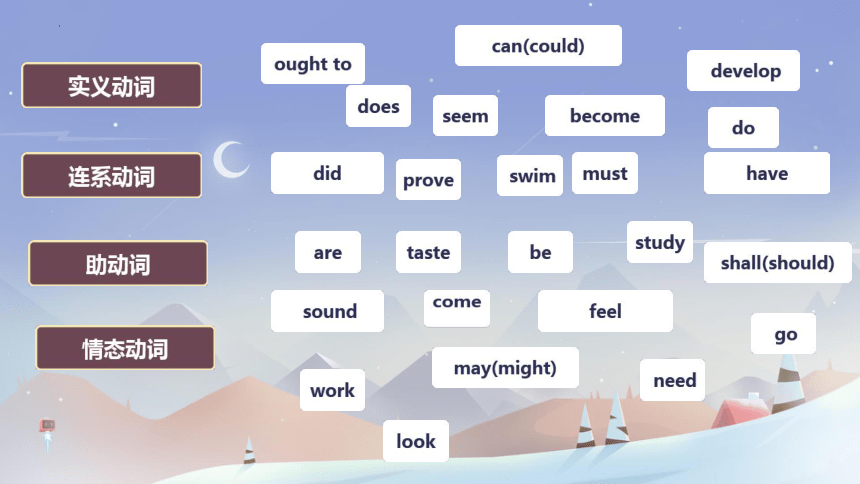 | |
| 格式 | pptx | ||
| 文件大小 | 964.9KB | ||
| 资源类型 | 教案 | ||
| 版本资源 | 通用版 | ||
| 科目 | 英语 | ||
| 更新时间 | 2024-04-22 07:34:49 | ||
图片预览



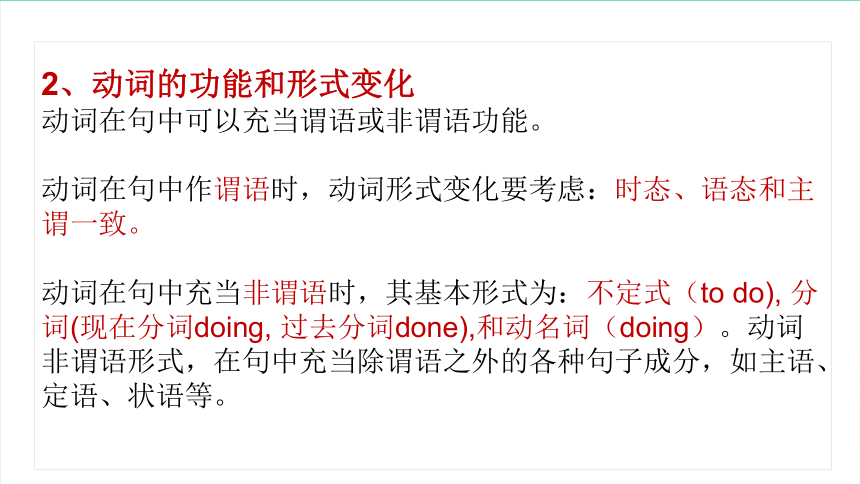
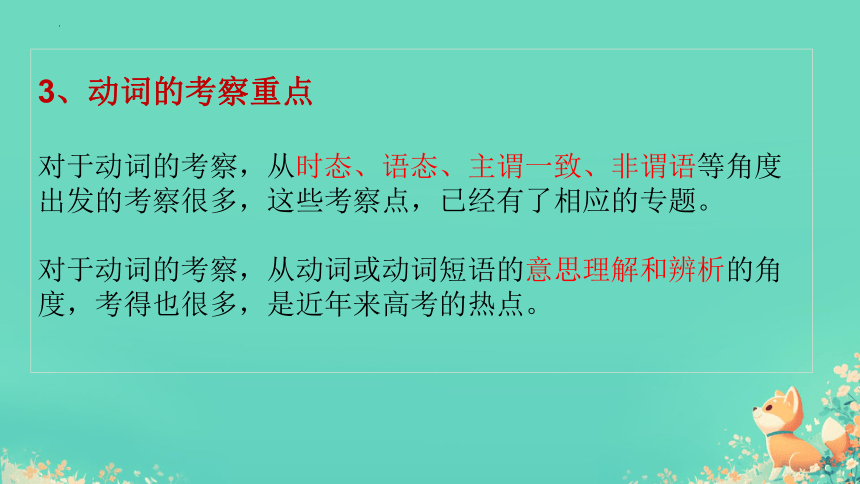
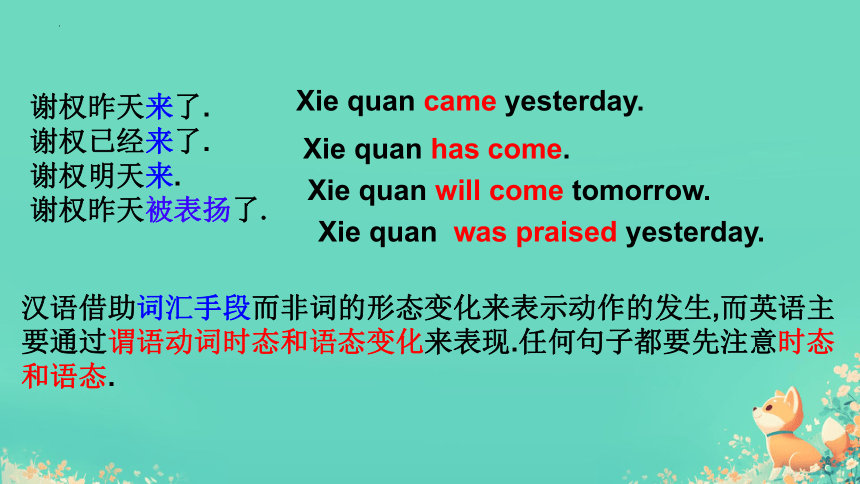

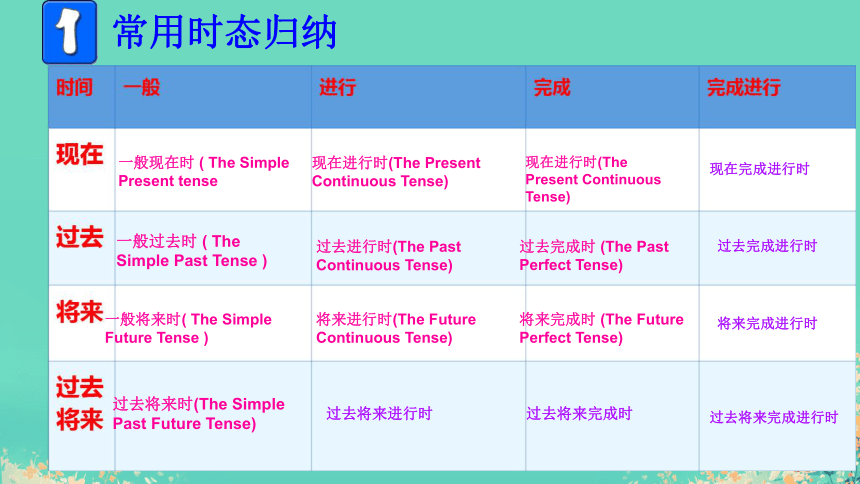
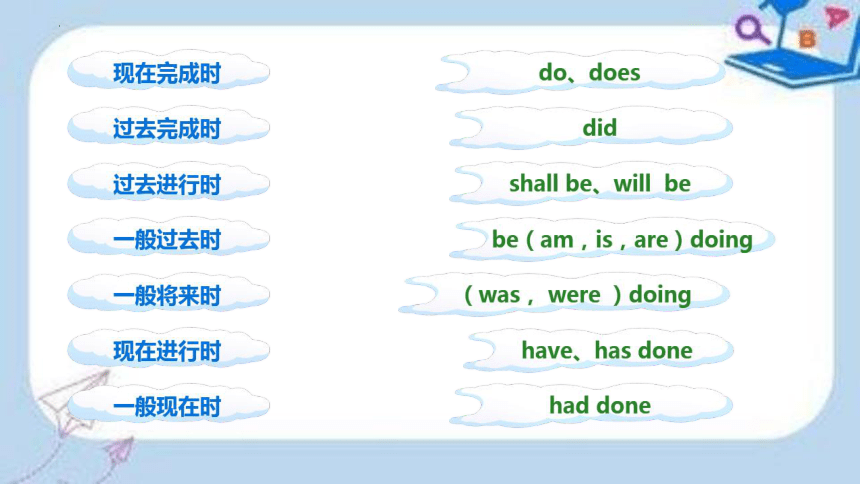
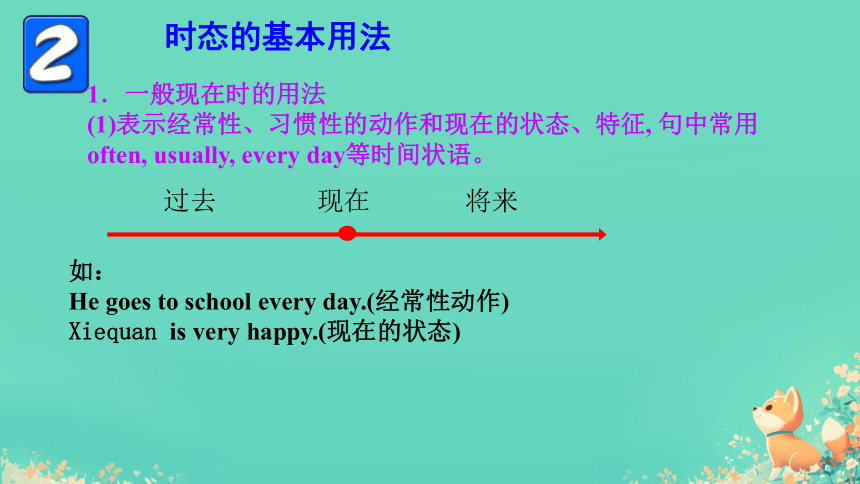


文档简介
(共33张PPT)
谓语动词
verb
动词的分类
动词的功能和变化
动词的考查重点
1、动词的分类
行为动词(实义动词)含及物动词(带宾语):study, develop;和不及物动词(不带宾语)work, swim, go, come
连系动词:如appear, become, feel, look, sound, seem, taste, prove, remain, stay, smell, grow, turn, go, come, fall, stand, lie, exist等
助动词:如be(am,is,are), do(does,did);have(has); will,would,shall
情态动词:如:can(could),may(might),must,shall(should),ought to, need, dare等
2、动词的功能和形式变化
动词在句中可以充当谓语或非谓语功能。
动词在句中作谓语时,动词形式变化要考虑:时态、语态和主谓一致。
动词在句中充当非谓语时,其基本形式为:不定式(to do), 分词(现在分词doing, 过去分词done),和动名词(doing)。动词非谓语形式,在句中充当除谓语之外的各种句子成分,如主语、定语、状语等。
3、动词的考察重点
对于动词的考察,从时态、语态、主谓一致、非谓语等角度出发的考察很多,这些考察点,已经有了相应的专题。
对于动词的考察,从动词或动词短语的意思理解和辨析的角度,考得也很多,是近年来高考的热点。
谢权昨天来了.
谢权已经来了.
谢权明天来.
谢权昨天被表扬了.
Xie quan came yesterday.
Xie quan has come.
Xie quan will come tomorrow.
汉语借助词汇手段而非词的形态变化来表示动作的发生,而英语主要通过谓语动词时态和语态变化来表现.任何句子都要先注意时态和语态.
Xie quan was praised yesterday.
动词的时态和语态
一轮复习专项
一般过去时 ( The Simple Past Tense )
一般将来时( The Simple
Future Tense )
一般现在时 ( The Simple Present tense
现在进行时(The Present Continuous Tense)
过去进行时(The Past Continuous Tense)
现在进行时(The Present Continuous Tense)
过去完成时 (The Past Perfect Tense)
过去将来时(The Simple Past Future Tense)
常用时态归纳
将来进行时(The Future Continuous Tense)
过去将来进行时
将来完成时 (The Future Perfect Tense)
过去将来完成时
现在完成进行时
过去完成进行时
将来完成进行时
过去将来完成进行时
时态的基本用法
1.一般现在时的用法
(1)表示经常性、习惯性的动作和现在的状态、特征, 句中常用often, usually, every day等时间状语。
如:
He goes to school every day.(经常性动作)
Xiequan is very happy.(现在的状态)
过去
现在
将来
(2)表示按计划、规定要发生的动作。如begin, come, leave, go, arrive, start, stop, return, open, close等。
The train starts at nine in the morning.
火车早上九点钟开。
(3)表示客观真理
The earth moves around the sun.
(4) 在时间状语从句和条件状语从句中, 用现在时代替将来时。
如:If you come this afternoon, we’ll have a meeting.
如果下午你来, 我们就开会。
2. 一般过去时的用法
表示过去某时间发生的事、存在的状态或过去反复发生的动作。如:
过去
现在
将来
He saw Yangyang yesterday.
Zhongzixu worked in a factory in 2021.
3.一般将来时的用法
一般将来时表示将来的动作或状态, 有以下几种。
“be going to+动词原形”
表示“计划、打算要做某事”
表示根据现在的迹象,对未来进行推断。
It is going to rain. 天要下雨了。
We are going to have a meeting today.
今天我们开个会。
(2)“will或shall+动词原形”表示说话时临时决定干某事。
I will answer it.
(3)“be to+动词原形”表示按计划要发生的事
Are we to go on with this work
我们要继续这项工作吗?
(4)“be about to+动词原形”表示即将发生的动作。如:
The plane is about to leave.
飞机即将起飞。
(5)某些词, 如come, go, leave, arrive, start等的一般现在时可表示将来。如:
The meeting starts at five o'clock.
会议五点钟开始。
4.现在进行时的用法
(1)表示此时此刻正在进行的动作, 由“be+现在分词”构成。
如:
Zhujiale is sleeping now.
(2)按计划、安排近期发生的动作。
如:
I’m leaving for Ganzhou tomorrow.
如:
Liqi is always helping others.
(3)与always, constantly等连用, 表示感彩。
5.过去进行时的用法
(1)表示过去某一时刻、某一阶段正进行的动作, 由“was (were)+现在分词”构成。
如:
Hufuxing was playing phone games when Mr liu came in.
(2)与always, forever, constantly连用, 表示赞成或厌恶的感彩。
如:
Suchenxin was always looking at himself in the mirror during class .
6.现在完成时的用法
现在完成时由“has/have+过去分词”构成。有2种用法:
(1) 持续性用法
Miss Li has taught us English for 3 months.
(2)影响或结果
Zhongzixu has finished his homework.
7. 过去完成时的用法
表示过去的过去
By the time he was twelve, Edison had begun to make a living by himself.
到了十二岁那年, 爱迪生开始自己谋生。
I had learnt 5000 words before I entered the
university.
我上大学之前就已经学了5000个英语单词了。
When the police arrived, the thieves ____________ (run away).
When I came into the classroom, my dear students ____ (begin) reading.
had run away
had begun
过去
现在
将来
过去完成
如:
They were sure that they would succeed.
他们确信他们会成功。
8. 过去将来时的用法
表示从过去的某时间看来将要发生的动作或存在的状态。由“should或would+动词原形”构成。第一人称用should, 其他人称用would。
1、胡福星已经三天没吃饭了。
2、杨洋的腿受前天伤了。
3、苏晨新现在在笑。
4、我们将在六月毕业。
动词的语态
语态有两种:主动语态和被动语态。
主语是动作的发出者为主动语态;
主语是动作的接受者为被动语态。
被动语态
主动语态
1、I study English every day.
English is studied (by me) every day .
2、I studied English yesterday.
English was studied (by me ) yesterday
3、I will study English tomorrow.
English will be studied tomorrow .
被动语态
主动语态
4、I have studied English for ten years.
English has been studied for ten years.
5、I am studying English now
English is being studied now.
6、I was studying English at this time yesterday.
English was being studied at -----
一般现在时: be( am/are/is) + done
一般过去时: be(was/ were) + done
一般将来时: will be + done
过去将来时: would be + done
现在进行时: be( am/are/is)+ being+ done
过去进行时:be was / were )+ being+ done.
现在完成时: have/ has+ been + done.
过去完成时:had + been + done
翻译下面句子
3、大家认为,他是八班最靓的仔。(believe)
1、胡福星的作业昨天已经完成,所以今天被表扬了。(praise)
4、我不知道这本书属于谁。(belong to)
2、钟仔旭说他被杨洋欺骗了。(cheat)
5、这个脐橙(navel orange)吃起来很甜。(taste)
1、Hu Fuxing finished his homework yesterday, so he was praised today.
2、Zhong Zixu said he had been cheated by Yang Yang.
3、It is believed that he is the most handsome boy in class 8.
4、I don't know who this book belongs to.
5 、This navel orange tastes sweet.
要想正确地使用被动语态,就须注意哪些动词是及物的,哪些是不及物的。特别是一词多义的动词往往有两种用法。解决这一问题唯有在学习过程中多留意积累。
其它常见的被动语态句型:
熟背一下词组:make oneself done, be seated
It is said that…
It is reported that …
It is hoped that …
It is known that …
It is thought\believed that …
据说
据报道
大家希望
众所周知
大家认为
例如:请让你自己被理解。
Please make yourself understood.
没有被动语态的动词和动词词组
1.Vi不及物动词
appear出现, disappear消失,
例如:1,这本书属于谁
Whom does this book belong to
2,在过去的几年里,瑞金发生了巨大变化。
Great changes have taken place in Ruijin in the past/last few years.
come true实现=be realized被实现,
happen =come about, take place, break out 发生
belong to 属于
2.系动词无被动
例如:1,他似乎很健康。
He appeared quite well.
2,树到了秋天会变黄。
Trees turn yellow in autumn.
状态类
感官类
变化类
保持类
The silk is soft.
3,丝绸摸起来很柔软。
The silk feels soft.
feel, look , sound, smell, taste/
become, turn, get, grow, fall, go,
keep, remain, stay, stand保持,仍然
be,/appear, seem显得,似乎/
Challenge yourself!!!!
单句填空 用括号中所给动词或动词短语的适当形式填空。
1. When money __________(spend), we can earn it back, but when time is lost, it will never return.
2. Customers are asked to make sure that they __________ (give) the right change before leaving the shop.
3. Great changes __________(take place) in the city, and a lot of factories ____ ______(set up).
4. The police found that the house __________(break into) and a lot of things __________(steal).
is spent
have been given
have taken place
have been set up
had been broken into
stolen
5. The discussion __________(come) alive when an interesting topic was brought in.
6. The head teacher says that all the preparations for the party __________ (complete) by Friday.
7. The wet weather will continue tomorrow when a cold frost __________(expect) to arrive.
8. The careless driver is __________(blame) for the traffic accident that __________(happen) yesterday.
came
will have been completed
is expected
to blame
happened
谓语动词
verb
动词的分类
动词的功能和变化
动词的考查重点
1、动词的分类
行为动词(实义动词)含及物动词(带宾语):study, develop;和不及物动词(不带宾语)work, swim, go, come
连系动词:如appear, become, feel, look, sound, seem, taste, prove, remain, stay, smell, grow, turn, go, come, fall, stand, lie, exist等
助动词:如be(am,is,are), do(does,did);have(has); will,would,shall
情态动词:如:can(could),may(might),must,shall(should),ought to, need, dare等
2、动词的功能和形式变化
动词在句中可以充当谓语或非谓语功能。
动词在句中作谓语时,动词形式变化要考虑:时态、语态和主谓一致。
动词在句中充当非谓语时,其基本形式为:不定式(to do), 分词(现在分词doing, 过去分词done),和动名词(doing)。动词非谓语形式,在句中充当除谓语之外的各种句子成分,如主语、定语、状语等。
3、动词的考察重点
对于动词的考察,从时态、语态、主谓一致、非谓语等角度出发的考察很多,这些考察点,已经有了相应的专题。
对于动词的考察,从动词或动词短语的意思理解和辨析的角度,考得也很多,是近年来高考的热点。
谢权昨天来了.
谢权已经来了.
谢权明天来.
谢权昨天被表扬了.
Xie quan came yesterday.
Xie quan has come.
Xie quan will come tomorrow.
汉语借助词汇手段而非词的形态变化来表示动作的发生,而英语主要通过谓语动词时态和语态变化来表现.任何句子都要先注意时态和语态.
Xie quan was praised yesterday.
动词的时态和语态
一轮复习专项
一般过去时 ( The Simple Past Tense )
一般将来时( The Simple
Future Tense )
一般现在时 ( The Simple Present tense
现在进行时(The Present Continuous Tense)
过去进行时(The Past Continuous Tense)
现在进行时(The Present Continuous Tense)
过去完成时 (The Past Perfect Tense)
过去将来时(The Simple Past Future Tense)
常用时态归纳
将来进行时(The Future Continuous Tense)
过去将来进行时
将来完成时 (The Future Perfect Tense)
过去将来完成时
现在完成进行时
过去完成进行时
将来完成进行时
过去将来完成进行时
时态的基本用法
1.一般现在时的用法
(1)表示经常性、习惯性的动作和现在的状态、特征, 句中常用often, usually, every day等时间状语。
如:
He goes to school every day.(经常性动作)
Xiequan is very happy.(现在的状态)
过去
现在
将来
(2)表示按计划、规定要发生的动作。如begin, come, leave, go, arrive, start, stop, return, open, close等。
The train starts at nine in the morning.
火车早上九点钟开。
(3)表示客观真理
The earth moves around the sun.
(4) 在时间状语从句和条件状语从句中, 用现在时代替将来时。
如:If you come this afternoon, we’ll have a meeting.
如果下午你来, 我们就开会。
2. 一般过去时的用法
表示过去某时间发生的事、存在的状态或过去反复发生的动作。如:
过去
现在
将来
He saw Yangyang yesterday.
Zhongzixu worked in a factory in 2021.
3.一般将来时的用法
一般将来时表示将来的动作或状态, 有以下几种。
“be going to+动词原形”
表示“计划、打算要做某事”
表示根据现在的迹象,对未来进行推断。
It is going to rain. 天要下雨了。
We are going to have a meeting today.
今天我们开个会。
(2)“will或shall+动词原形”表示说话时临时决定干某事。
I will answer it.
(3)“be to+动词原形”表示按计划要发生的事
Are we to go on with this work
我们要继续这项工作吗?
(4)“be about to+动词原形”表示即将发生的动作。如:
The plane is about to leave.
飞机即将起飞。
(5)某些词, 如come, go, leave, arrive, start等的一般现在时可表示将来。如:
The meeting starts at five o'clock.
会议五点钟开始。
4.现在进行时的用法
(1)表示此时此刻正在进行的动作, 由“be+现在分词”构成。
如:
Zhujiale is sleeping now.
(2)按计划、安排近期发生的动作。
如:
I’m leaving for Ganzhou tomorrow.
如:
Liqi is always helping others.
(3)与always, constantly等连用, 表示感彩。
5.过去进行时的用法
(1)表示过去某一时刻、某一阶段正进行的动作, 由“was (were)+现在分词”构成。
如:
Hufuxing was playing phone games when Mr liu came in.
(2)与always, forever, constantly连用, 表示赞成或厌恶的感彩。
如:
Suchenxin was always looking at himself in the mirror during class .
6.现在完成时的用法
现在完成时由“has/have+过去分词”构成。有2种用法:
(1) 持续性用法
Miss Li has taught us English for 3 months.
(2)影响或结果
Zhongzixu has finished his homework.
7. 过去完成时的用法
表示过去的过去
By the time he was twelve, Edison had begun to make a living by himself.
到了十二岁那年, 爱迪生开始自己谋生。
I had learnt 5000 words before I entered the
university.
我上大学之前就已经学了5000个英语单词了。
When the police arrived, the thieves ____________ (run away).
When I came into the classroom, my dear students ____ (begin) reading.
had run away
had begun
过去
现在
将来
过去完成
如:
They were sure that they would succeed.
他们确信他们会成功。
8. 过去将来时的用法
表示从过去的某时间看来将要发生的动作或存在的状态。由“should或would+动词原形”构成。第一人称用should, 其他人称用would。
1、胡福星已经三天没吃饭了。
2、杨洋的腿受前天伤了。
3、苏晨新现在在笑。
4、我们将在六月毕业。
动词的语态
语态有两种:主动语态和被动语态。
主语是动作的发出者为主动语态;
主语是动作的接受者为被动语态。
被动语态
主动语态
1、I study English every day.
English is studied (by me) every day .
2、I studied English yesterday.
English was studied (by me ) yesterday
3、I will study English tomorrow.
English will be studied tomorrow .
被动语态
主动语态
4、I have studied English for ten years.
English has been studied for ten years.
5、I am studying English now
English is being studied now.
6、I was studying English at this time yesterday.
English was being studied at -----
一般现在时: be( am/are/is) + done
一般过去时: be(was/ were) + done
一般将来时: will be + done
过去将来时: would be + done
现在进行时: be( am/are/is)+ being+ done
过去进行时:be was / were )+ being+ done.
现在完成时: have/ has+ been + done.
过去完成时:had + been + done
翻译下面句子
3、大家认为,他是八班最靓的仔。(believe)
1、胡福星的作业昨天已经完成,所以今天被表扬了。(praise)
4、我不知道这本书属于谁。(belong to)
2、钟仔旭说他被杨洋欺骗了。(cheat)
5、这个脐橙(navel orange)吃起来很甜。(taste)
1、Hu Fuxing finished his homework yesterday, so he was praised today.
2、Zhong Zixu said he had been cheated by Yang Yang.
3、It is believed that he is the most handsome boy in class 8.
4、I don't know who this book belongs to.
5 、This navel orange tastes sweet.
要想正确地使用被动语态,就须注意哪些动词是及物的,哪些是不及物的。特别是一词多义的动词往往有两种用法。解决这一问题唯有在学习过程中多留意积累。
其它常见的被动语态句型:
熟背一下词组:make oneself done, be seated
It is said that…
It is reported that …
It is hoped that …
It is known that …
It is thought\believed that …
据说
据报道
大家希望
众所周知
大家认为
例如:请让你自己被理解。
Please make yourself understood.
没有被动语态的动词和动词词组
1.Vi不及物动词
appear出现, disappear消失,
例如:1,这本书属于谁
Whom does this book belong to
2,在过去的几年里,瑞金发生了巨大变化。
Great changes have taken place in Ruijin in the past/last few years.
come true实现=be realized被实现,
happen =come about, take place, break out 发生
belong to 属于
2.系动词无被动
例如:1,他似乎很健康。
He appeared quite well.
2,树到了秋天会变黄。
Trees turn yellow in autumn.
状态类
感官类
变化类
保持类
The silk is soft.
3,丝绸摸起来很柔软。
The silk feels soft.
feel, look , sound, smell, taste/
become, turn, get, grow, fall, go,
keep, remain, stay, stand保持,仍然
be,/appear, seem显得,似乎/
Challenge yourself!!!!
单句填空 用括号中所给动词或动词短语的适当形式填空。
1. When money __________(spend), we can earn it back, but when time is lost, it will never return.
2. Customers are asked to make sure that they __________ (give) the right change before leaving the shop.
3. Great changes __________(take place) in the city, and a lot of factories ____ ______(set up).
4. The police found that the house __________(break into) and a lot of things __________(steal).
is spent
have been given
have taken place
have been set up
had been broken into
stolen
5. The discussion __________(come) alive when an interesting topic was brought in.
6. The head teacher says that all the preparations for the party __________ (complete) by Friday.
7. The wet weather will continue tomorrow when a cold frost __________(expect) to arrive.
8. The careless driver is __________(blame) for the traffic accident that __________(happen) yesterday.
came
will have been completed
is expected
to blame
happened
